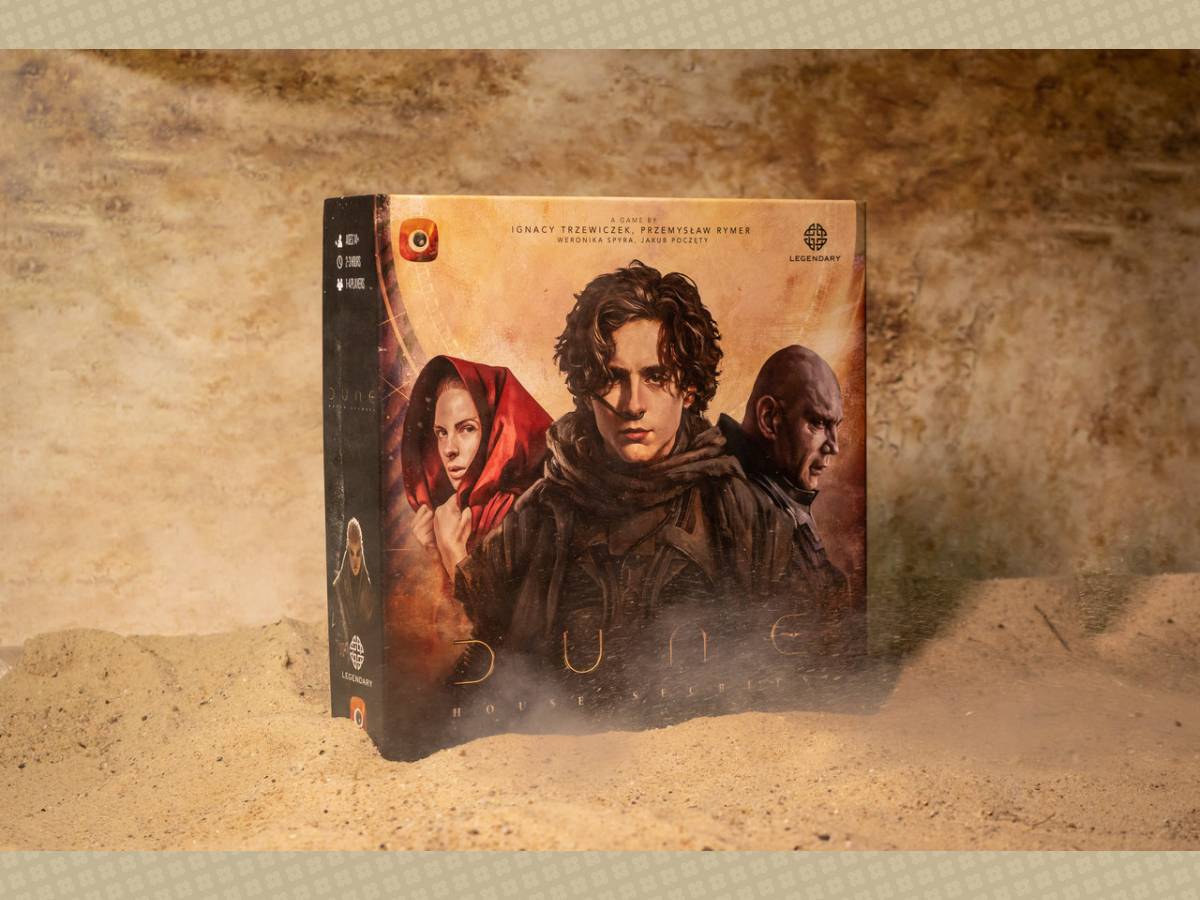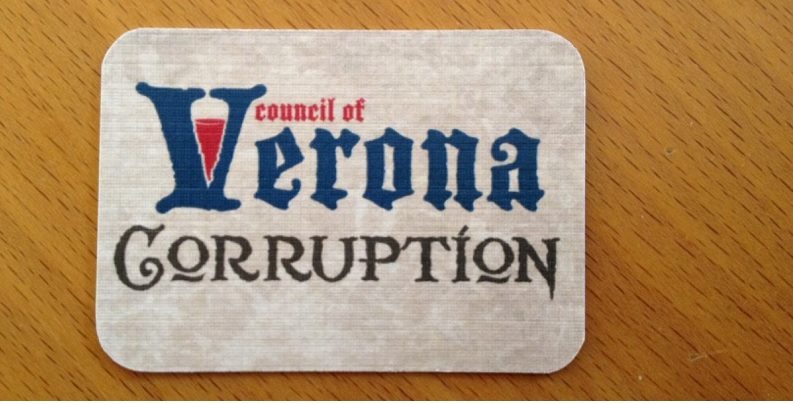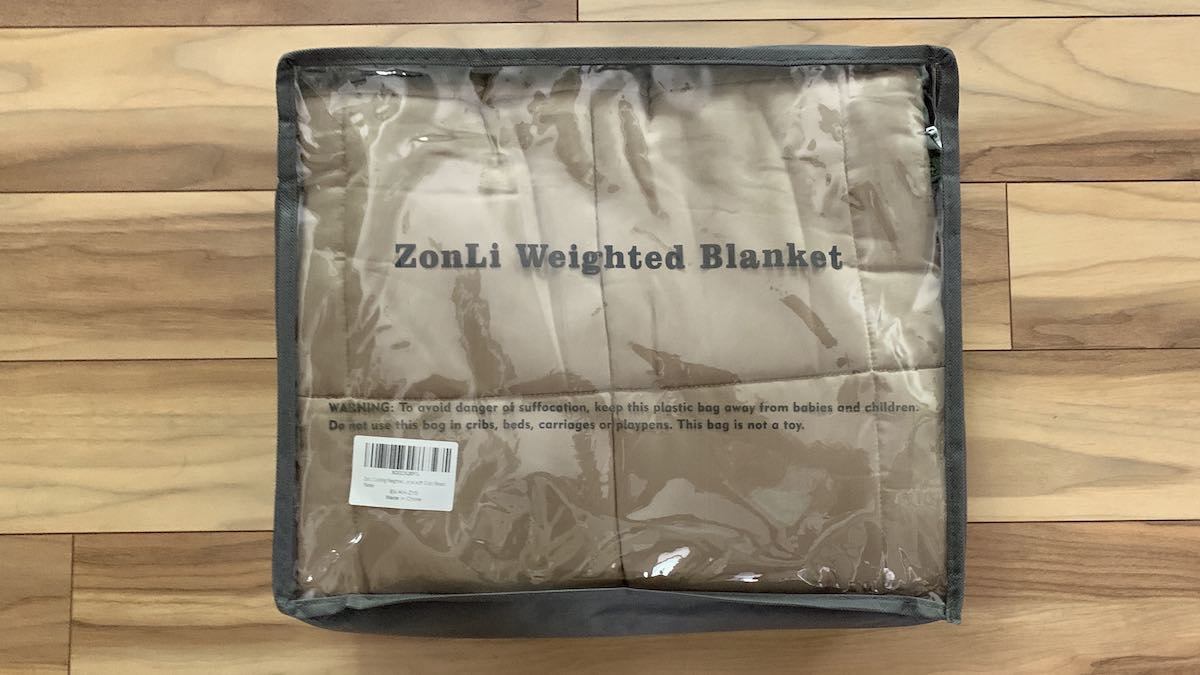The brutal Harkonnens have wrested control of Arrakis from House Atreides. As a member of the resistance, how will you uncover the secrets of the desert planet also known as Dune?
What Is Dune: House Secrets?
Dune: House Secrets is a cooperative storytelling game for 1-4 players, ages and 14 and up, and according to the box takes about 90-180 minutes to play. In reality, most sessions will probably run closer to 45-60 minutes, depending on how much deliberation happens with your game group. As it’s a cooperative game and the rules are not difficult to grasp, it can be played by younger teens. However, there’s also a lot of attention to detail and discussion required, so your mileage may vary. Dune: House Secrets retails for $45, and can be purchased from Amazon or directly through Portal Games’ webstore.
Dune: House Secrets was designed by Jakub Poczęty, Przemysław Rymer, Ignacy Trzewiczek, and Weronika Spyra and published by Portal Games, with illustrations by Maciej Janik and Mateusz Kopacz.

Dune: House Secrets Components
Here’s what comes with Dune: House Secrets:
- 68-card Encounter Deck
- 23-card Asset Deck
- Prologue and 3 Chapter Introductions
- Consequence Marker
- Time Marker
- Game Board
- 5 Consequence Tokens
- 27 Resource Tokens
- Skill Sticker Sheet
- 4 Character/Advocate Boards
- Map of Dune
- Map of Tel Gezer
- Rulebook

While nicely illustrated, the cards are not of the highest quality. They’ve been square-cut, and won’t hold up well to heavy use. However, this is not a game that invites a lot of replay (more on that later), so the quality of the cards isn’t a huge issue except for aesthetics.

The Game Board is fashioned from the same cardstock as the two card decks. Quality again shouldn’t be much of a gameplay issue, but the thin card may slide around a bit on your table if you’re not playing with a neoprene playmat, as I was. There are two nice wooden markers to use for the Time Track and Consequence Track. The Time Track runs down as you play through encounters, while the Consequence Track will determine how many experience points you have to spend at the end of each chapter.

All of the tokens in the game are made from cardboard, and are all readily distinctive from each other. It would have been nice if the Game Board and Character Boards had been made of cardboard as well instead of thin cardstock, but that may have been a measure to keep costs down.
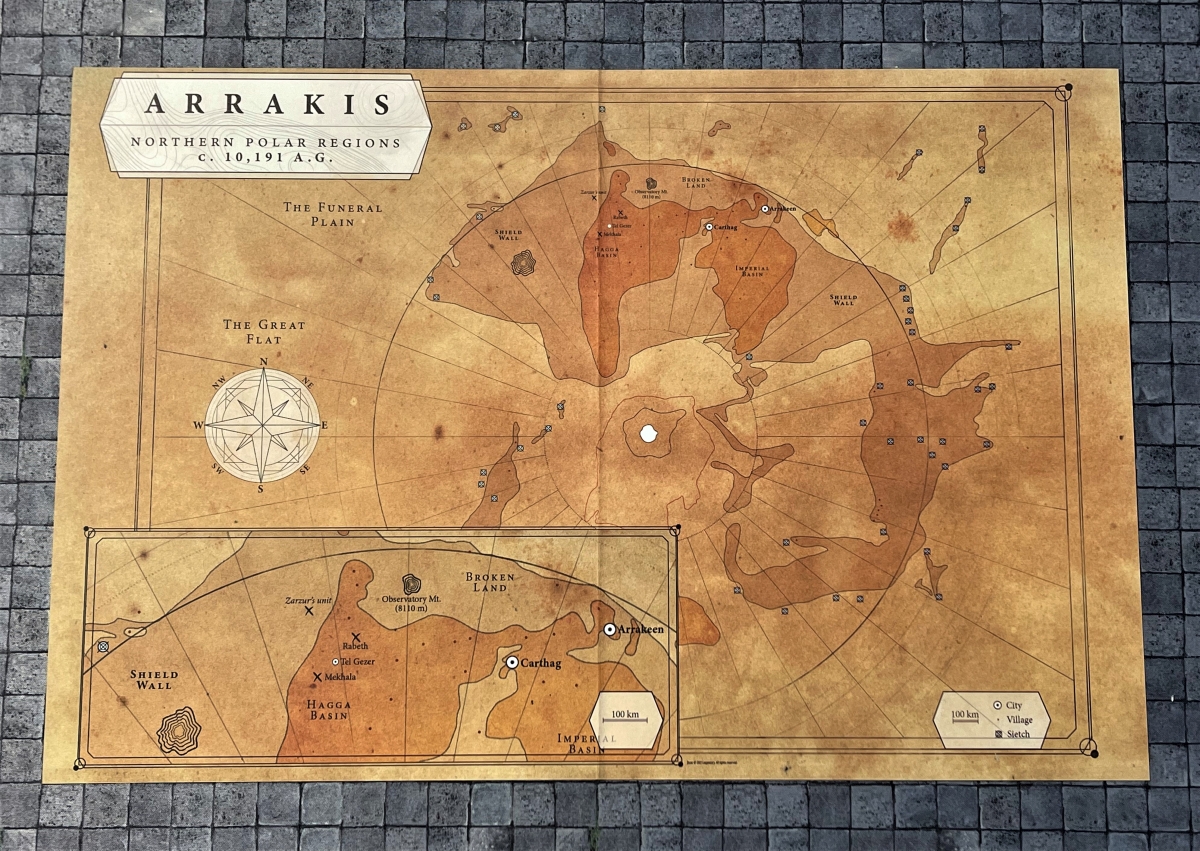
The two maps included in the game are both of high-quality paper, and embody the look of a desert planet.
You will also have to provide two other components yourself to play Dune: House Secrets: a pen and paper to take notes, and a tablet/smartphone/laptop to access the dune.playdetective.online website.
How to Play Dune: House Secrets
You can download a copy of the rulebook here.
The Goal
The goal of the game is to accomplish the missions assigned to you in each chapter.

Setup
Place the Game Board in the middle of the table, with the Consequence Marker on the leftmost spot on the Consequence Track.
If you are continuing the story from a previous chapter, prepare your resource pool as indicated by the notes from your last game, and place those and the Encounters and Assets that you have previously earned in the play area. If you are playing through the Prologue, gather the assets as indicated on the Character Boards.
Each player takes their Character Boards. If playing with fewer than 4 players, flip any unchosen characters to their Advocate side.

Place the Encounter and Asset decks near the Game Board. Mix all the Consequence Tokens facedown, and place them in a pool near the Game Board. Place the Map of Dune nearby.
Gather pen and paper for taking notes, then log into the dune.playdetective.online website, and watch the introductory video for the chapter you are about to play. Finally, take the appropriate physical Chapter Introduction, read it, and follow its instructions to start the game.
Gameplay
You play the game by resolving encounters. The Prologue and Chapter Introductions indicate the initial Encounter Cards that are available to you to pursue.
To resolve an encounter, you’ll draw the Encounter Card with the corresponding number from the Encounter deck. You then immediately reduce the Time Track by one.
Read the card aloud to all players. You will not flip over the card unless instructed to do so. Then follow all of the instructions on the card. Place the card near the Game Board for reference.
Besides advancing the story, there are several actions that a card may have you take:
Flip
When you see the flip card symbol, you may turn the card over and read on the back. Sometimes, you may not be allowed to flip it over unless you’ve spent a resource token or drawn a Consequence token.

Draw 1 Consequence
When you see the symbol for a Consequence token, you draw one from the facedown pile and reveal it. If it shows green, nothing happens, and it is discarded back in the box. If it shows red, then reduce the Consequence Track by 1, and shuffle the token back into the facedown pile.

Take an Asset Card
Draw the Asset card associated with the letter shown. Follow any instructions shown on the card.
Encounters
You may now draw and resolve any additional Encounter cards, as indicated by the numbers shown.

Gaining access to some Encounter cards may require spending a resource, as with card 010 above. And sometimes, Encounter cards will reward resources, based on the choices you have made.
History and Filmbook
When you see those symbols, you’ll log onto the dune.playdetective.online website and enter the corresponding number on the card. You’ll then be provided with video and audio information.

Game End
The game session ends when the Time Track reaches the farthest space on the right. At that point, you log into the dune.playdetective.online website, choose “Status Report,” and answer the questions about the progress you’ve made in your missions. The outcomes of your choices are then presented to you.
After completing the Status Report, check to see how much experience you have based on where the Consequence Marker is on the Consequence Track. You may then purchase skills, based on how much XP you have, which chapters you have completed, and if you have unlocked a previous level of a skill.
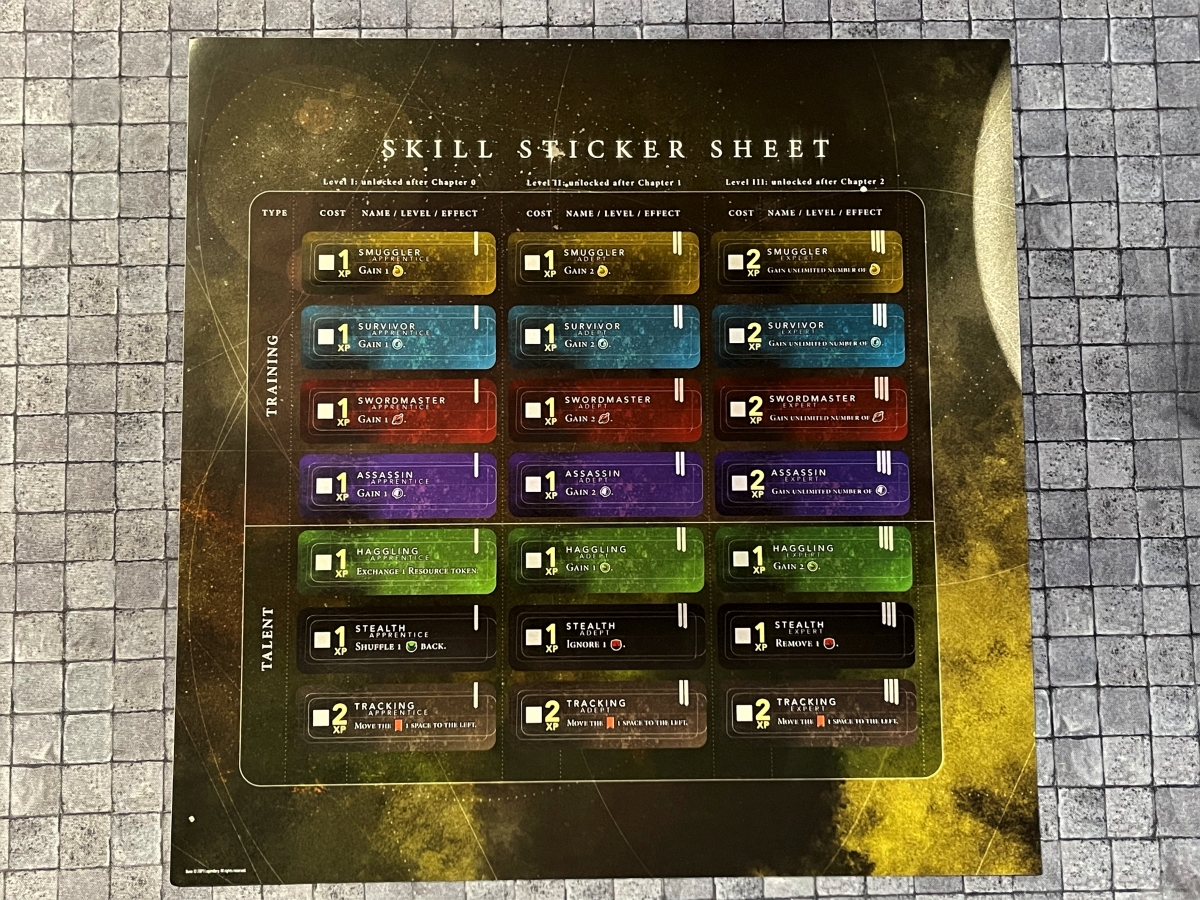
The Skill stickers are applied directly to the Character boards.
Finally, make a note on the Progress Sheet at the back of the rulebook as to which Encounters and Resource Tokens you have access to for the next chapter.
The story of Dune: House Secrets is complete at the end of Chapter 3.
Why You Should Play Dune: House Secrets
First, a bit of a caveat for this review. As this is primarily a storytelling game, I’ll try not to say anything too specific about the narrative, so as not to spoil your playthrough should you pick up the game.
Dune: House Secrets was built off the framework of the multiple award-winning Detective series of games. In those games, you gather clues, both in card form and online, in order to solve crimes. Dune: House Secrets functions the same on a superficial level, but feels a bit like a rough draft of a Detective game. While there is some deduction work on the players’ part, often it can feel a bit inconsequential, especially when you make your Status Reports at the end of each chapter. While not exactly being an adventure on rails, I found that I had enough time and resources available to me in each chapter to draw and resolve almost all of the Encounter cards. Rather than being an active detective, having to carefully choose which leads to pursue, I found myself more often than not choosing the order in which I wanted to pursue leads. The few occasions that I made a choice on an Encounter card that led directly to a story consequence was all the more gratifying for its rarity.
The writing for Dune: House Secrets is strong, and feels authentic for the setting. However, this is a double-edged sword, as the world will feel inaccessible and overwhelming for those not familiar with Frank Herbert’s Dune. This is a game best played by people already familiar with the source material.
The use of the dune.playdetective.online website with Dune: House Secrets is inconsistent. Some of the files that you access contain clues, which aid in the immersion of the game and make you feel a bit clever that you’ve discovered them. But other times, especially with the History entries, you’re receiving backstory on the history and factions of Dune. The latter is redundant information for those already conversant with the novel or film’s story.
As a cooperative game, you can certainly play the game solo. As a matter of fact, because every character is used in a game no matter how many players there are, you’ll actually get more resources to use the fewer players that you have. Starting a game with the Character board on the Advocate side awards you with two resource tokens as compared with a Player character’s one.
Portal Games is intending to make Dune: House Secrets the first in a trilogy of games. Currently, the game feels a bit more “choose your own adventure” than playing as a group of detectives. The story itself is compelling, and the writing engaging, but I’d love to see a stronger emphasis on the gameplay that has made the other Detective games a success. Hopefully Portal will be able to strike a better balance between narrative and deduction in the other two games in the trilogy.
If you’re a fan of Dune, then Dune: House Secrets will provide an enjoyable experience. It can be played in a shorter time than what’s suggested on the box, and you likely could play through the prologue and all three chapters in a single, longer gaming session. And without spoiling anything, playing through the entire game will, like many a good story, give you an ending that will have you anticipating where things might head in the next chapter.
For more information or to purchase a copy, visit Portal Games’ Dune: House Secrets page.
Click here to see all our tabletop game reviews.
![]() To subscribe to GeekDad’s tabletop gaming coverage, please copy this link and add it to your RSS reader.
To subscribe to GeekDad’s tabletop gaming coverage, please copy this link and add it to your RSS reader.
Disclosure: GeekDad received a copy of this game for review purposes. As an Amazon affiliate, I may earn a small commission on qualified purchases.
